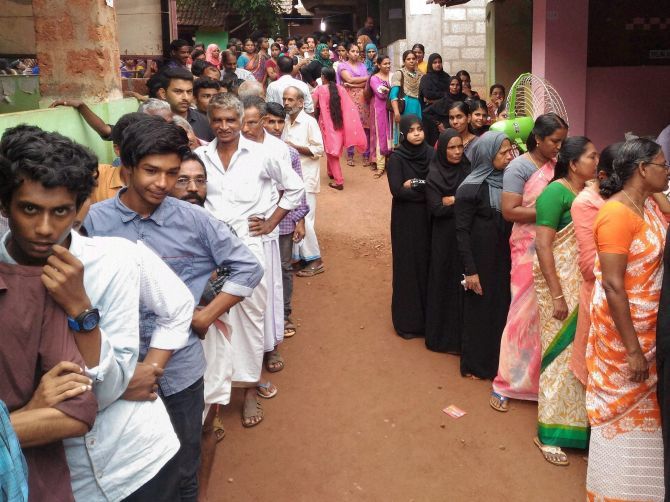 | « Back to article | Print this article |
Political funding of elections has led to the rise in black money, say Former RBI governor D Subbarao and former CAG Vinod Rai.
Subhomoy Bhattacharjee reports:

Former Reserve Bank of India governor D Subbarao and former Comptroller and Auditor General of India Vinod Rai have said political funding of elections has led to the rise in black money in the economy.
While strongly supporting the demonetisation drive undertaken by the government as 'a serious measure to flush out black money' and 'bold decisions' in two separate essays, both have also noted that it will create an unavoidable short-term 'disruption' to the economy and 'hurt growth.'
According to Rai, to make the benefits of demonetisation stick, the government should immediately go for tightening 'of all transactions in the real estate sector' and cut back space for opaque funding of political parties.
The essays have been published by the Institute of South Asian Studies, National University of Singapore where both are visiting fellows.
Lauding the government's move, Dr Subbarao notes: 'Even as the economic case for de-legalisation is strong, it is possible that there were also some political economy calculations that weighed with the government.'
'It is common knowledge that unaccounted for cash, especially in high denominations, plays a big role in financing election expenditure beyond the authorised limits. The government may have decided to choke this avenue and cleanse the system ahead of the next round of state elections due in 2017.
While Prime Minister Narendra Modi said this week that the demonetisation of Rs 500 and Rs 1,000 notes would be followed up with more steps in different sectors of the economy including real estate, the issue of political funding has not been mentioned.
'It needs to be recognised that one move of demonetisation in the entire process of eradicating the scourge of black money will not provide the policy momentum to actually usher in reforms,' Rai, the current chairman of the Bank Boards Bureau, suggested.
'The move would, in fact, lead to frustration and disillusionment among the people who might feel that, despite the hardship that they faced, this action, too, is soon forgotten with business returning to the usual mode,' Rai added.
'Indian elections cost huge sums of money. These moneys can hardly come from retail contributions by political-party sympathisers. It has to come from big corporate houses. But contributions from corporate houses are largely from undeclared income and, hence, the contribution is not recorded...' Rai said, adding, 'Thus, the giving and receiving of such money are both illegal.'
According to Rai, this is even more necessary than the gains from switchover to electronic cash in the rural areas to erase black money.
Buttressing his argument, Dr Subbarao has pointed to the 'uncharacteristic expansion of currency in circulation, clearly out of line with the pace of expansion of economic activity'.
Elaborating on the benefits of Modi's measure, Dr Subbarao notes demonetisation will 'spur economic activity into a virtuous cycle. This will be further buttressed by the windfall deposits that banks will get which can be as high as 7.5 per cent of GDP.'
The other benefits, according to him, are disinflation and improvement in the government finances.
He estimates it as additional tax revenue of 0.5 per cent of GDP (Rs 65,000 crore/Rs 650 billion).
'This will help fiscal consolidation, investment in infrastructure and in crowding in private investment,' Dr Subbarao added.
His reasoning stands against the argument offered by former finance minister P Chidambaram in an article in The Indian Express that there will be no such benefit.
On the other major windfall of transfer of additional surplus from the RBI to the finance ministry, Dr Subbarao says this may need an amendment of the RBI Act.
He has estimated the surplus which demonetisation will generate for RBI at about Rs 3.5 lakh crore. According to him, it is because of some these unanswered issues that the government may have used the term 'cancelling the legal tender character of the currency,' instead of demonetisation.
The former RBI governor's estimate of surplus is lower than the ones by SBI Research by about Rs 1 lakh crore.
Both are emphatic that the demonetisation was timely.
'The Modi government has both the challenge and opportunity of making (demonetisation), different,' Subbarao notes.
'The government,' Rai argues, 'appear(s) to have made up its mind to resort to serious measures to flush out black money.'
IMAGE: People queue to cast their vote in Chennai in May. Photograph: PTI Photograph published only for representational purposes.